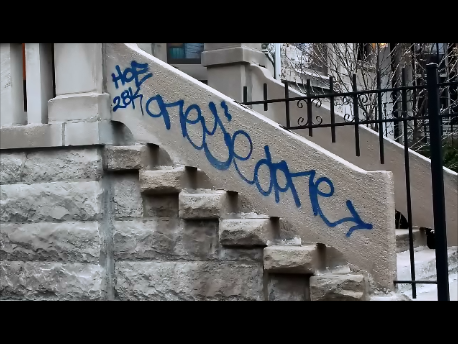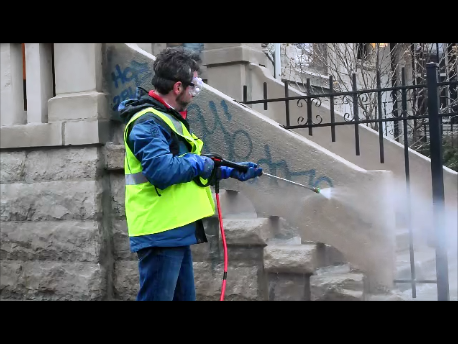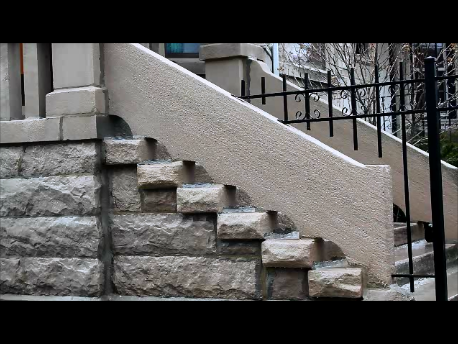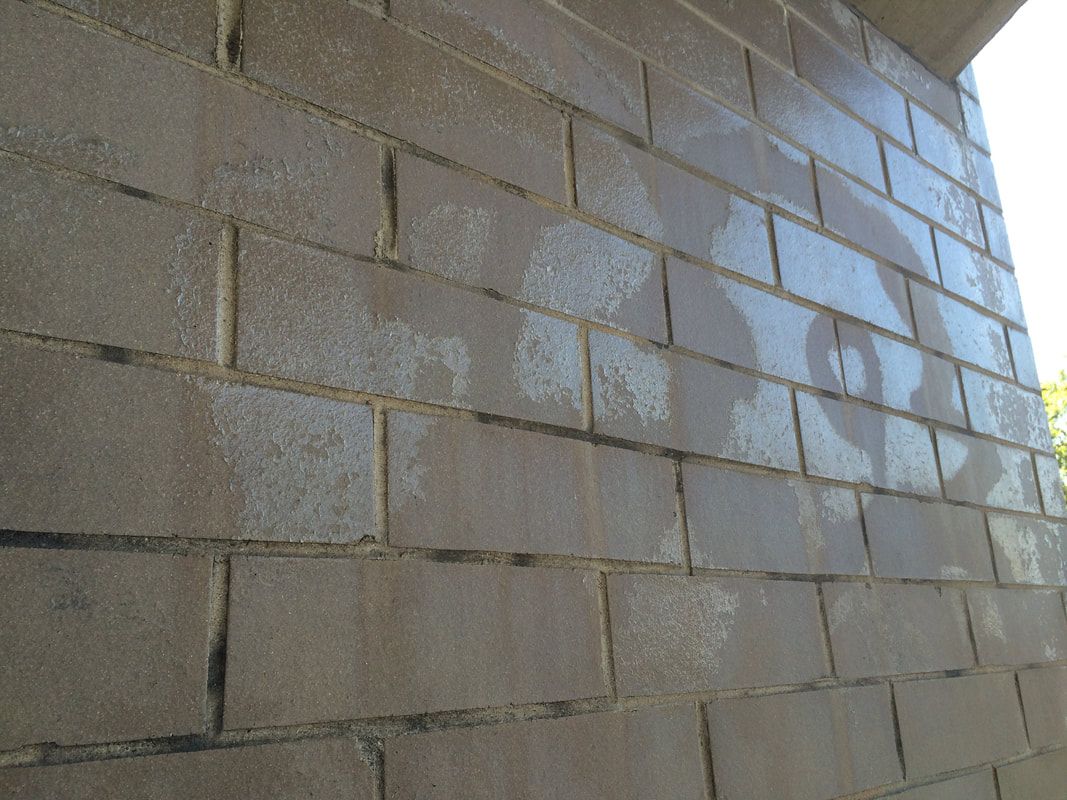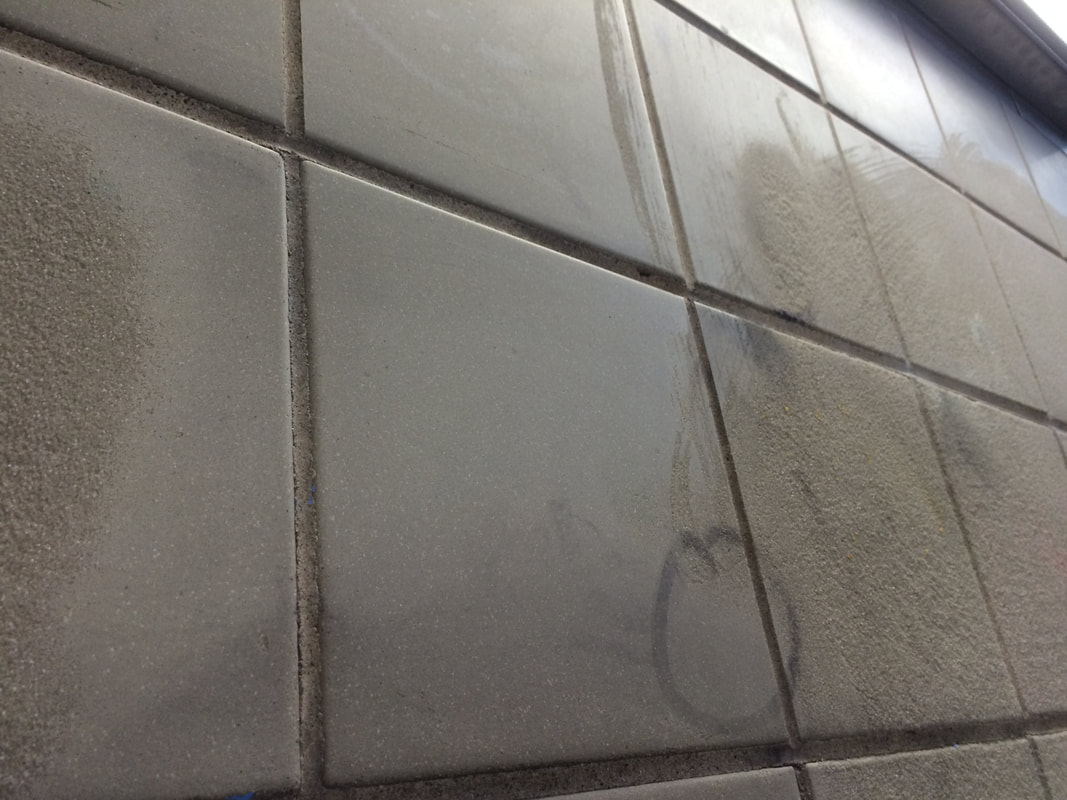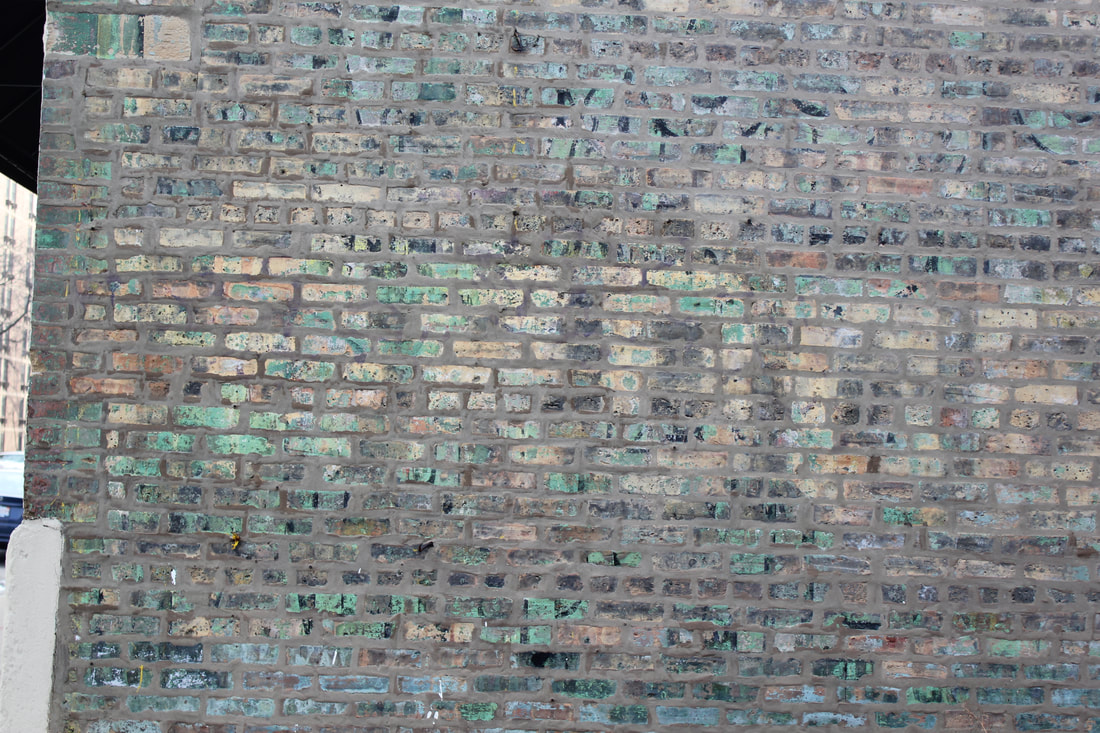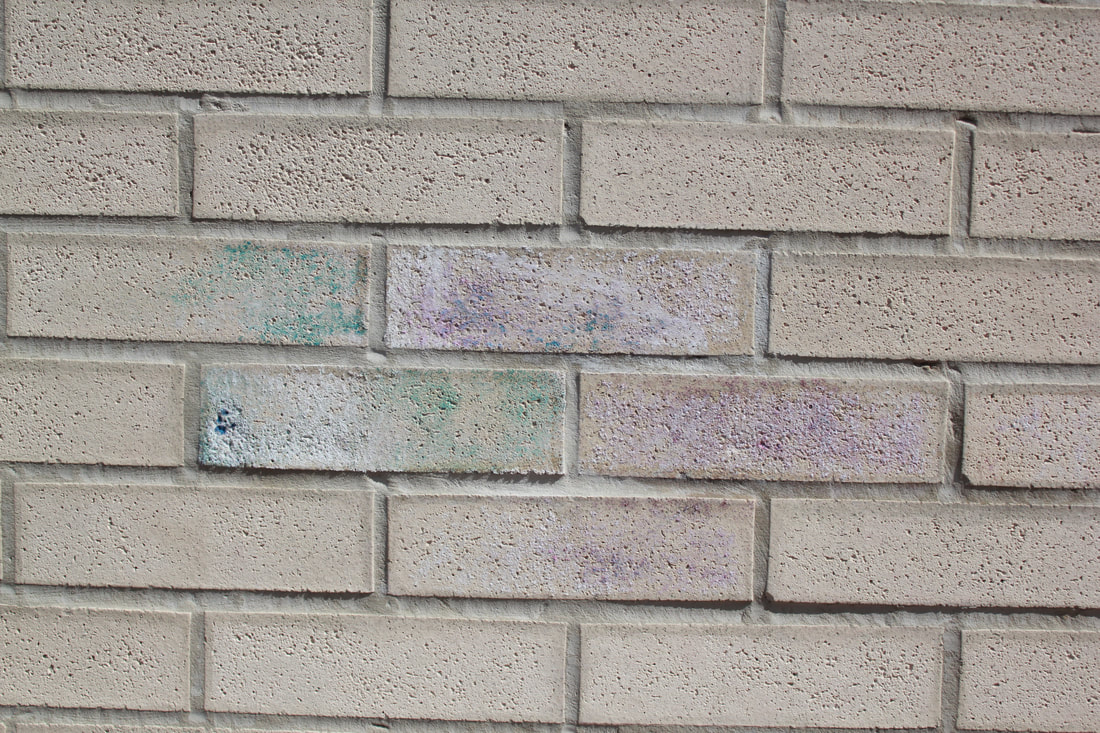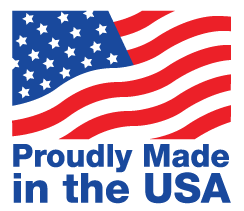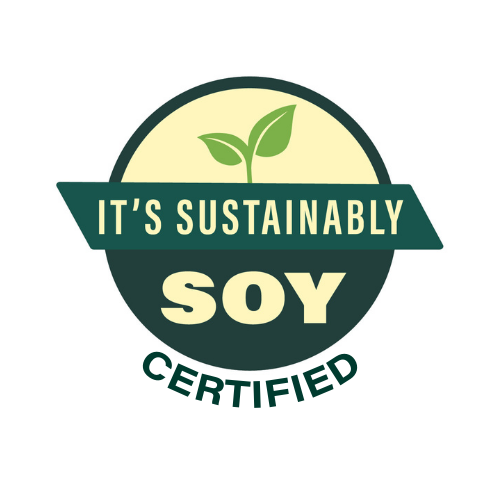How to Remove Graffiti Spray Paint from Stone, Limestone, Rock, and Boulders.
3 Simple Steps to Remove Graffiti from Stone, Limestone, Rock and Boulders.
Step 1: Spray, pour or brush Clean City Pro Red Label Graffiti Remover or Clean City Pro Blue Label Gel Graffiti Remover onto graffiti tag.
Step 2: Allow a moderate dwell time of 5 to 30 minutes
Note: A longer or shorter dwell time is possible depending on conditions. If spray paint is highly saturated, the limestone is highly porous or the temperature is cold, allow for a longer dwell time.
Step 3: Pressure wash using a wide, fan tip pressure washing nozzle such as 25 degree green tip. Repeat if necessary.
Note: If water source is not available for pressure washer and rinsing, such as cleaning graffiti from National Park, Municipal Park or Forest Preserve, following dwell time, scrub using stiff nylon or brass brush taking care not to scratch surface. Remove as much product and paint pigment using dry absorbent rags or towels. Spray with water from hand held trigger sprayer and dry using dry absorbent rags or towels
Step 1: Spray, pour or brush Clean City Pro Red Label Graffiti Remover or Clean City Pro Blue Label Gel Graffiti Remover onto graffiti tag.
Step 2: Allow a moderate dwell time of 5 to 30 minutes
Note: A longer or shorter dwell time is possible depending on conditions. If spray paint is highly saturated, the limestone is highly porous or the temperature is cold, allow for a longer dwell time.
Step 3: Pressure wash using a wide, fan tip pressure washing nozzle such as 25 degree green tip. Repeat if necessary.
Note: If water source is not available for pressure washer and rinsing, such as cleaning graffiti from National Park, Municipal Park or Forest Preserve, following dwell time, scrub using stiff nylon or brass brush taking care not to scratch surface. Remove as much product and paint pigment using dry absorbent rags or towels. Spray with water from hand held trigger sprayer and dry using dry absorbent rags or towels
On Sale
On Sale
Clean City Pro Blue Label Gel Heavy Duty Graffiti Remover
$25.99
$22.99 - $259.99
Clean City Pro Blue Label Gel Heavy Duty Graffiti Remover
Removes Spray Paint and Permanent Marker from Concrete, Brick, Stone and other Difficult Surfaces
|
STILL NOT SURE WHICH PRODUCT IS BEST FOR YOU? OR HAVE OTHER QUESTIONS? |
Tips and Tips and Techniques to Maximize Graffiti Removal Effectiveness from Limestone
TIP#1 - Time is your friend
Tip #1 - Time is your friend. The longer the dwell time, the more effectively the graffiti remover can soften the graffiti tag spray paint. Unlike conventional graffiti removers which evaporate rapidly, Clean City Pro graffiti removers are super low VOC and alcohol-free which results in very slow evaporation. This provides much greater dwell-time, effectiveness, economy, and ease of use with when compared with conventional graffiti removers.
If dwell time is adequate, graffiti spray paint will become soft and buttery. The softer the paint, the less pressure is required to rinse the graffiti paint from the tiny pores in the brick. Lower pressure is easier on brick, mortar joints, and older, more delicate historic brick. Lower pressure also allows a lower PSI, residential grade, electric-powered pressure washer to be as effective as a higher PSI, professional grade, gas-power pressure washer.
If dwell time is adequate, graffiti spray paint will become soft and buttery. The softer the paint, the less pressure is required to rinse the graffiti paint from the tiny pores in the brick. Lower pressure is easier on brick, mortar joints, and older, more delicate historic brick. Lower pressure also allows a lower PSI, residential grade, electric-powered pressure washer to be as effective as a higher PSI, professional grade, gas-power pressure washer.
Tip #2 - Warmer is better
Tip #2 - Warmer is better. Heat helps to accelerate the speed at which the graffiti remover can soften the spray paint graffiti tag. Graffiti removal is more effective when ambient temperatures are warmer. Summer temperatures allow more rapid graffiti removal. If in the Northeast or Midwest, expect longer dwell times during the cold winter months.
Warm water also increases the effectiveness of graffiti removal. If possible, connect pressure washer to warm water source. Higher end professional grade pressure washers have heating elements. Residential grade pressure washers will perform better if hot water is sourced, perhaps from slop sink faucet or domestic hot water heater. If attempting graffiti removal from brick during the winter, hot water is essential for achieving excellent results.
Warm water also increases the effectiveness of graffiti removal. If possible, connect pressure washer to warm water source. Higher end professional grade pressure washers have heating elements. Residential grade pressure washers will perform better if hot water is sourced, perhaps from slop sink faucet or domestic hot water heater. If attempting graffiti removal from brick during the winter, hot water is essential for achieving excellent results.
Tip #3 - Elbow grease to speed things along
Tip #3 - Elbow grease to speed things along. For small graffiti tags or if increased speed is required, scrubbing or abrasion with a stiff nylon bristle or brass bristle brush can be effective. For thicker paint, or multiple layers of paint, scrubbing tends to move the top layer of paint aside, allowing the next layer of paint to be exposed to the graffiti remover. This technique is especially effective when applied to paints that were brushed or to remove thick drips of paint. Scrubbing also allows for greater economy as a single application of graffiti remover can soften multiple layers of paint before being rinsed. Extra care should always be taken not to damage delicate historic surfaces including brick, terra cotta, sandstone and limestone.
Tip #4 - A Little extra goes a long way
Tip #4 - Reapplying a little more graffiti remover during dwell time can make the process more effective. Clean City Pro Graffiti Remover remains active for as long as it remains in contact with the graffiti paint so reapplication during dwell time is not necessary. However, if any spots were missed or were very think during initial application, paint will remain fully bonded during pressure washing. By reapplying during the dwell time period, you increase your chances of full coverage and having a great result.
Tip # 5 - Do No Harm. How to Avoid Damaging concrete during Graffiti Removal.
Tip #5 - How to avoid damaging limestone during graffiti removal and do no harm. Limestone is a durable building material that is often used on commercial and residential buildings. Fortunately, limestone is strong and able to withstand multiple graffiti removal cleanings using graffiti remover and pressure washer. Limestone is a naturally occurring stone, so a range of porousness and grain exists between different types from different quarries. Not surprisingly, limestone that is more porous and is more challenging to remove graffiti from than smoother limestone or polished limestone which typically has a denser composition and smoother surface. Some limestone has white flecks of quartz which tend to absorb paint pigment and are extraordinarily challenging to fully clean.
Many chemical techniques for graffiti removal from limestone to remove all of the graffiti spray paint pigment. With a uniform light grey color, if even a small percentage of graffiti spray paint remains bonded to the limestone, it is often visible to the naked eye. When graffiti spray paint remains visible after a partially successful graffiti removal, it is referred to as graffiti ghosting or graffiti shadow.
Limestone can be easily damaged by highly corrosive or highly acidic graffiti remover chemicals. Limestone can also be damaged by highly abrasive graffiti removal techniques such as soda blasting. Once the Limestone's quarry finish is eroded or etched, it is very hard to restore it to it original condition.
Many chemical techniques for graffiti removal from limestone to remove all of the graffiti spray paint pigment. With a uniform light grey color, if even a small percentage of graffiti spray paint remains bonded to the limestone, it is often visible to the naked eye. When graffiti spray paint remains visible after a partially successful graffiti removal, it is referred to as graffiti ghosting or graffiti shadow.
Limestone can be easily damaged by highly corrosive or highly acidic graffiti remover chemicals. Limestone can also be damaged by highly abrasive graffiti removal techniques such as soda blasting. Once the Limestone's quarry finish is eroded or etched, it is very hard to restore it to it original condition.
Most chemical graffiti removal techniques require a pressure washing following the application of the chemical graffiti remover. This is an important step which rinses chemical graffiti remover and any dissolved or broken spray paint from the limestone substrate. Care must be taken to reduce the PSI of the pressure washer so that the intense pressure does not damage the limestone surface by etching away the top layer of concrete. Etching damage can easily be caused by a red-colored zero-degree spray nozzle. To avoid this, it is recommended to use a wide, fan-tip pressure washing nozzle such as a green 25 degree nozzle. The wide fan tip diffuses the pressure and reduces the PSI on the concrete. This reduced pressure decreases likelihood of causing permanent etching damage to limestone.
